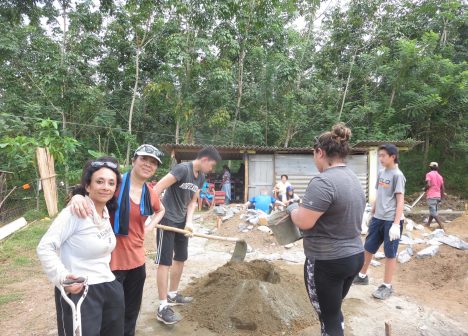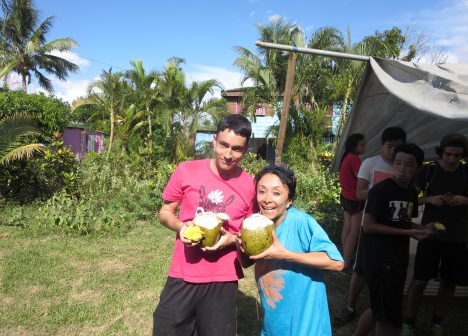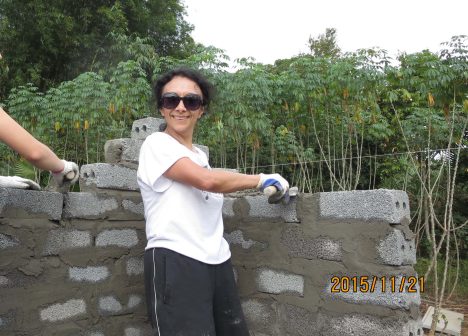The American School in Japan (ASIJ) is a longstanding supporter of Habitat Japan. The school’s student-led Habitat Club has actively participated in our initiatives through the Global Village (GV) overseas building program and by advocating for the need of safe and decent shelter for all.
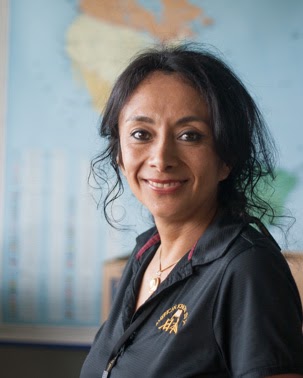 Sandy Blodgett has worked at ASIJ for fifteen years as a Spanish teacher and has been involved with the club since 2007, much of that time as one of its advisors. During her tenure, she accompanied ten different GV teams, totaling more than four hundred students, to eight countries. At the end of this school year, Sandy and her husband Seth retired to seek new adventures. The following is our interview with her.
Sandy Blodgett has worked at ASIJ for fifteen years as a Spanish teacher and has been involved with the club since 2007, much of that time as one of its advisors. During her tenure, she accompanied ten different GV teams, totaling more than four hundred students, to eight countries. At the end of this school year, Sandy and her husband Seth retired to seek new adventures. The following is our interview with her.
Habitat Japan: How did you come to be an advisor of the Habitat Club?
Sandy: I had heard briefly about Habitat before getting involved with the ASIJ Habitat club. Their mission really resonated with me, perhaps because of growing up in Ecuador. My mom told me that it was essential to own a house so that one's family can be kept safe from the natural elements. Only after satisfying one of the most basic human physiological needs of having shelter can one concentrate on education and hold a steady job. That is the door to well-being and prosperity in society. When I joined ASIJ, I was asked to help another club; however, in my second year, the position to be a sponsor for this club opened up, and I jumped at it. I started working with David Norris, who had plenty of experience working with Habitat in Kenya.
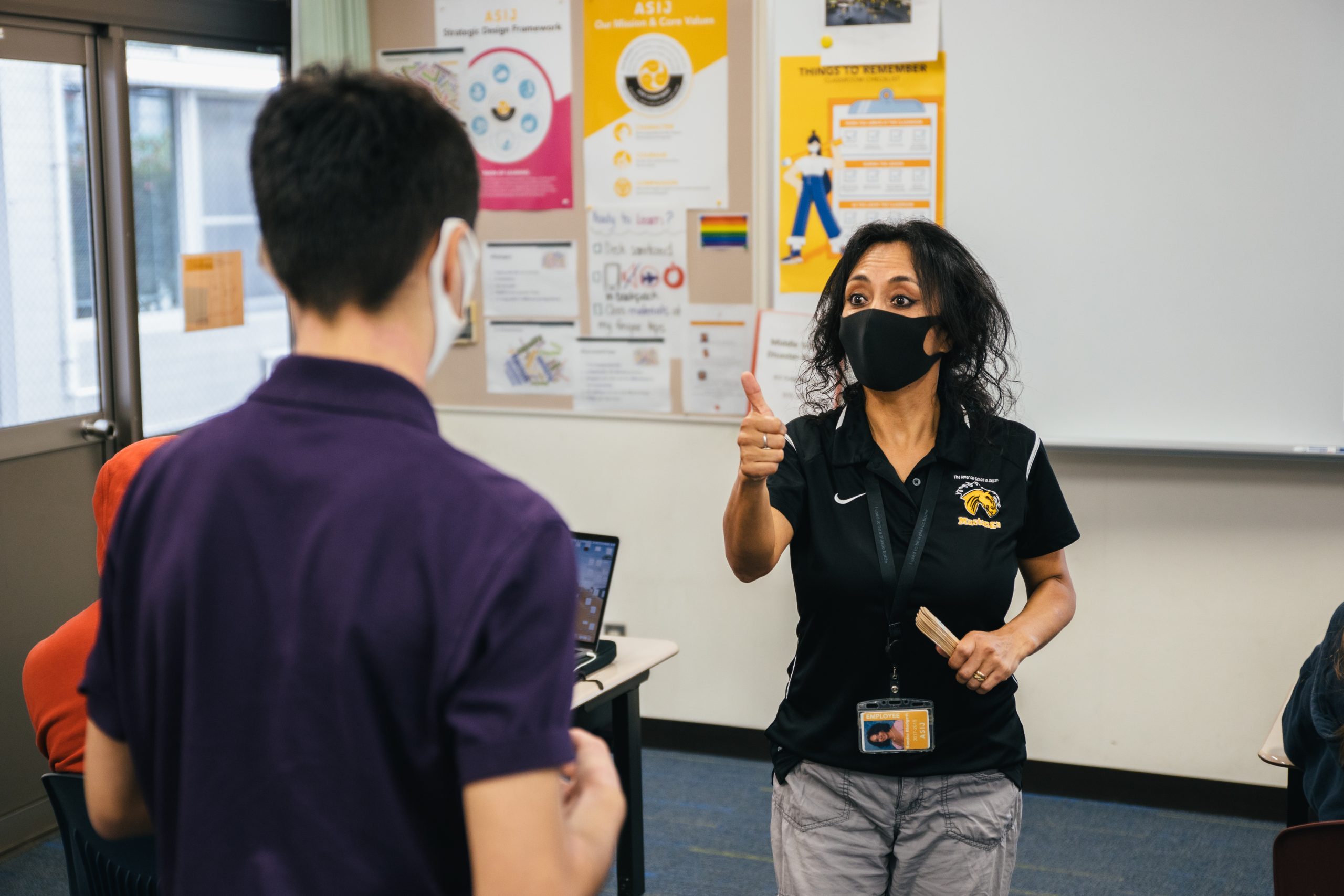 Habitat Japan: Before joining a GV project, were there any fundraising efforts by the GV teams?
Habitat Japan: Before joining a GV project, were there any fundraising efforts by the GV teams?
Sandy: Fundraising has always been one of the priorities for the club at ASIJ. The goal was to offset the cost of the trips. My first year, we had a parent bake 40 batches of cinnamon twists, which the students helped make and sold at a school festival. The following year, the family returned to the USA, so David and I decided to try to do the baking. Oh my, we had some interesting years of learning the art of baking, the logistics of mass production, and managing over 50 students who were involved on the day of fundraising.
Habitat Japan: Why do you think it was important for your students to join GV trips? How has GV influenced your students?
Sandy: Participating in GV projects in other countries gives ASIJ students an opportunity to experience kindness, generosity, and happiness at a different level than they are used to. Students get to interact with homeowner families, play with children in the villages, and do heavy physical labor. Homeowners and kids in the village always share what little they have with us. Playing the sports and games our kids are used to with the locals helps the student realize that we all are human beings and have the same needs, hopes, dreams and wants. This leads to more empathic, tolerant, and compassionate students, who, in time, will make this a better world.
Habitat Japan: What is the most challenging part of leading and organizing a GV trip?
Sandy: Besides getting all the paperwork straight, and mainly because of deadlines and the amount of communication with parents, the most difficult thing when leading a GV trip is being in charge of students. Teachers become parents of 22-30 teenagers at once! At the same time, this is the most rewarding part as we get to know the students on a more personal level. Leading a trip is a big responsibility; teachers are in charge of students 24 hours a day for a whole week in a foreign country where one does not speak the language and does not know the hospitals and whereabouts, and the culture is new as well. We are assigned GV personnel in the host country to assist us. They have always been very helpful and friendly, and we have always had great support; however, the teachers are responsible for the students' well-being, which has always been the biggest responsibility and concern. Before each trip, I always prayed for everyone to return home healthy, happy, and proud of doing a good job.
Habitat Japan: What was your most unforgettable GV memory?
Sandy: I have been on ten GV trips to eight different countries, all of which have been unforgettable and incredible for different reasons. For example, in Bali, we worked with three widows on their build-sites who put in part of their sweat equity by moving cement blocks on their heads! It was a daily occurrence in Fiji to have Fijian kids working with us in the afternoons; they were all so friendly. One afternoon, they invited our students to play a game of rolling a wheel on the road while running. Everyone had so much fun learning, laughing, and playing together; it wasn’t as easy as it sounds! The generosity of the Sri Lankan people will not be forgotten; one day, I mentioned I like coconuts, and two days later, we got them during our break. In Thailand, the homeowners made lunch for us. A student had mentioned how much she liked papaya salad, and the next day, we had it on the menu. One of the home partners realized my tongue was on fire, and I could not eat it. They made papaya salad again on the last day, and I was given a portion with less spice. How thoughtful and generous of them! Malaysia was incredibly well-organized with the different tasks we were given each day; we were fortunate to be able to do the last part of the build: painting the house! In Vietnam, we laid the brick for two houses, and students were amazed at the difficulty of this task and the kindness of the skilled workers who patiently guided us. Cambodians were very accommodating and flexible. The building materials had not been delivered on time, so the students went on a cultural expedition first. For the remainder of the days, the work was smooth and well organized, and the projects ended as planned. According to one student who had been on many different trips, it was one of the best they had participated in. After every trip, all the students came back safe and sound. Maybe some acquired stomach bacteria, but that is part of the journey.
Habitat Japan: What does "home" mean to you?
Sandy: A home is that emotional place where one feels safe and secure. It's the place where a family can flourish, where children can be raised, and where one can start fulfilling their dreams and goals. A home to me is giving hope to a person to achieve a happier, healthier life.
Habitat Japan: What is your next adventure?
Sandy: After working for fifteen years at ASIJ, my husband and I are ready for a new adventure. We hope to travel for a bit to find our new home. One of my dreams is to be able to serve immigrants or refugees somewhere. We'll see what doors open up in the future for us.
At the end of the interview, she parted by saying, 'Many thanks for giving me the opportunity to collaborate with your mission; it has been a great privilege.' Habitat Japan appreciates her dedication and contributions towards helping the vulnerable find a safe and decent place to live. We believe Sandy will be helping those in need wherever she is.

